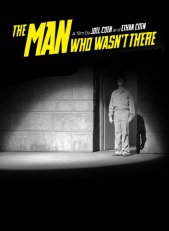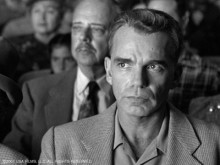| The Man Who Wasn't
There |
| |
 |
USA, 2001. Rated R. 116 minutes.
Cast: Billy Bob Thornton, Frances
McDormand, Michael Badalucco, James Gandolfini, Jon Polito, Scarlett Johansson,
Tony Shalhoub, Katherine Borowitz, Richard Jenkins, Christopher McDonald
Writers: Joel & Ethan Coen
Music: Carter Burwell
Cinematographer: Roger Deakins
Producers: Ethan Coen, Tim Bevan, Eric Fellner
Director: Joel Coen
LINKS
|
 n
terms of style, the new film from Joel and Ethan Coen is the opposite of their
previous movie, O Brother, Where Art Thou?. Where that film was ultra-colorful,
both in its photography and its acting, The Man Who Wasn't There is muted
and deadpan (which isn't to say that it is humorless, this is still a Coen brothers
film). Both films were shot in color, but O Brother's colors were enriched
and saturated via digital wizardry. The Man Who Wasn't There had its
color drained, leaving it resembling a black-and-white film. The absence of
vibrancy is important to The Man Who Wasn't There, because it's a film
about a man who loses everything he has, including, perhaps, his soul.
n
terms of style, the new film from Joel and Ethan Coen is the opposite of their
previous movie, O Brother, Where Art Thou?. Where that film was ultra-colorful,
both in its photography and its acting, The Man Who Wasn't There is muted
and deadpan (which isn't to say that it is humorless, this is still a Coen brothers
film). Both films were shot in color, but O Brother's colors were enriched
and saturated via digital wizardry. The Man Who Wasn't There had its
color drained, leaving it resembling a black-and-white film. The absence of
vibrancy is important to The Man Who Wasn't There, because it's a film
about a man who loses everything he has, including, perhaps, his soul.
The Man Who Wasn't There utilizes the conventions of film noir more
expressly than any Coen brothers film since Blood Simple. Most obviously,
its black and white palette is manipulated by the technique of chiaroscuro to
create foreboding shadows and ribbons of light that intersect the frame in bizarre
and unsettling ways, which belie the normalcy of the film's setting. That setting
is Santa Rosa, California, in 1949. (The town may be familiar to film buffs
as the locale for Alfred Hitchcock's Shadow of a Doubt.) In this seemingly
innocuous, jerkwater burg resides a barber named Ed Crane (played by Billy Bob
Thornton, who in black-and-white looks like a cross between Humphrey Bogart
and James Mason). "I never thought of myself as a barber," croaks Crane in the
film's first line, a deadpan voice-over that accompanies the rest of the movie
in a typically fatalistic noir fashion. In the film's opening words we learn
what our protagonist is not. Negation is a theme in the film; characters are
defined by what they didn't do, effort is revealed to be useless, and introspection
and investigation fruitless tasks.
AboutFilm.Com
The Big Picture
|
| Alison |
-
|
| Carlo |
B+
|
| Claudia |
-
|
| Dana |
-
|
| Jeff |
B+
|
| ratings explained |
Ed Crane is a man of few words. When he does speak, he takes his time and makes
every word count. Naturally, all his acquaintances are motor mouths, their logorrhea
a constant hum that overtakes him, and makes him a nonentity in any social situation.
His partner at the barbershop is his garrulous brother-in-law Frank (Michael
Badalucco), a man for whom no thought is too insignificant to expound upon verbally.
Frank's sister, Ed's wife, is as loud and assertive as Ed is quiet and reserved.
She is played by Coen brothers stalwart Frances McDormand in a brassy manner
that implies sexual freedom, and indeed, she is cheating on Ed with Big Dave
Brewster (James Gandolfini), the owner of a local department store with the
great name Nirdlingers. Ed is aware of her infidelity, but it's not until a
chance encounter with a sweaty, bewigged entrepreneur (Jon Polito) that Ed gets
the idea of blackmail into his head.
In most film noir, the protagonist is a basically decent fellow who gets into
trouble due either to a checkered past that comes back to haunt him, or a single
unwise decision, usually motivated by greed or lust. In Ed's case, it's the
latter, and his plan to blackmail Big Dave for $10,000 goes horribly, inevitably
wrong. The disaster is out of proportion to the sin that precipitated it, and
hence the noir hero's despairing feeling of the whole world out to get him.
The rest of the film follows Ed's attempts to wriggle free from this mess, but
like a beast stuck in a tar pit, his actions prove futile. The ineffectuality
of action is a recurring theme in the film. Ed's profession as a barber is the
primary example. As Ed states, no matter how much hair he cuts, it always grows
back. Where does it come from? What mark does he leave on the world? This question
is posed in the film's grimly ironic finale, by which time everything Ed has
attempted has been nullified by an opposite circumstance. The film gets its
title by rendering Ed Crane ultimately as the embodiment of the Superfluous
Man, without purpose or direction. 
Crane's plans for himself fail in every arena, with every other character in
the film. His lawyer, a fast-talking big shot from Sacramento named Freddy Riedenschneider
(Tony Shaloub, exhibiting the same barking-loon style that earned Michael Lerner
an Oscar Nomination for Barton Fink), strains to provide reasonable doubt
by applying Heisenberg's Uncertainty Principle, but he never gets a chance because
Ed's brother-in-law shortfuses the trial. Ed's pipe dream of becoming the manager
for the singing career of Birdy (Scarlett Johansson, calling to mind Lauren
Bacall) is waylaid by her lack of talent, and a beauty of a car accident. The
only thing Ed does accomplish is a lot of cigarette smoking. (This film contains
the most smoking since Out of the Past. In homage to that definitive
film noir, the Coens reprise the joke where one character offers another a cigarette
and the other responds by holding up the smoke he is already enjoying.)
Smoke looks great in black-and-white of course, and praise must be given to
director of photography Roger Deakins, who once again makes the Coen film its
year's most distinctive looking. Black-and-white films that have been made in
the last few years all look great. [I'm too young to remember when they were
the standard, and most of the older black-and-white films have decayed or worn
so much that they appear as to be artifacts rather than art (though color fares
even worse over time).] This film's clear, untarnished image highlights the
repressed passion that courses beneath the impassive exterior of Ed Crane. Its
crispness contrasts placidity with angst and defeat. It's a must-see in a dark
theater, where the shadows can blend into the black on the screen, and the film's
world becomes your world.
Review
© October 2001 by AboutFilm.Com and the author.
Images © 2001 USA Films. All Rights Reserved.


